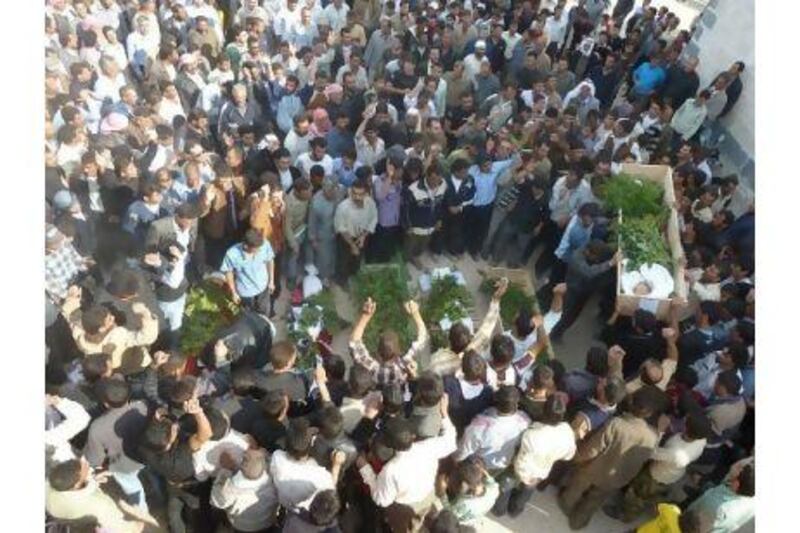BEIRUT // Up to 20 people died in new violence in Syria yesterday, a day after the regime promised to take its troops off the streets as part of an Arab League peace initiative.
Tanks fired heavy machineguns and anti-aircraft rounds at protesters in the Bab Amro district of Homs, the city at the heart of the uprising against the regime of the president, Bashar Al Assad.
Activists said at least 10 civilians had been killed in the bombardment of Bab Amro and elsewhere in Homs, as army snipers picked off victims from rooftops and soldiers fired from checkpoints.
"We slept late because there were overnight street rallies celebrating the Arab initiative. This morning we woke up to rain and shelling," said Samer, an activist in Bab Amro.
Another resident said the sound of explosions was rocking the city, and activists were calling on volunteers to donate blood for makeshift hospitals in and around the centre of Homs.
The violence does not bode well for the success of the Arab League initiative to solve a crisis that has endured for nearly eight months already, despite a government crackdown that the UN estimates has left more than 3,000 people dead.
Syria agreed on Wednesday to the Arab League plan to pull the army out of cities, free political prisoners and hold talks with the opposition. The Arab League secretary-general, Nabil Elaraby, briefed members of the main opposition National Council on the plan in Cairo.
"We did not talk with the secretary-general about a dialogue with the regime," council member Samir Nashar said after the meeting. "We discussed entering negotiations with the authorities to move from a totalitarian to a democratic system, and demanded that President Al Assad leave power."
The president's critics have dismissed his past offers of dialogue. Some say bloodshed must stop first, others that only his resignation can end the conflict.
Burhan Ghalioun, a leading National Council member based in Paris, questioned whether Syria would implement the plan. "The regime has accepted the Arab initiative out of fear of Arab isolation, its weakness and its lack of options. But its acceptance does not mean it will respect its clauses," he wrote.
On the streets in Syria, some demonstrators celebrated the Arab League initiative, but residents and activists said troops remained in cities and security operations continued, especially in Homs.
In the Damascus suburb of Harasta, at least 120 protesters were arrested overnight after celebrating the Arab League deal.
Media restrictions imposed by the regime have made it hard to verify events on the ground since the protests began in March. The peace initiative also calls for Syria to allow journalists and Arab League monitors into the country.
The International Committee of the Red Cross said on Wednesday it was pressing Syria for wider access to thousands of detainees arrested in pro-democracy protests.
Western sanctions and growing criticism from Turkey and Arab neighbours have raised pressure on Syria to end the bloodshed.
Despite the latest violence, Sami Baroudi, a political analyst at the Lebanese American University in Beirut, said it was too early to judge whether Syria would honour the agreement.
"It will take at least a couple of days to see whether the intensity of violence is going down or up, or staying at the same level," Mr Baroudi said.
"I wouldn't throw this initiative into the wastebasket because nothing happened immediately."
After the deal was announced in Cairo, the United States repeated its call for the Syrian president to quit. The Arab League has not suspended Syria's membership or backed international intervention, as it did against the late Muammar Qaddafi in Libya.
* Associated Press and Reuters






